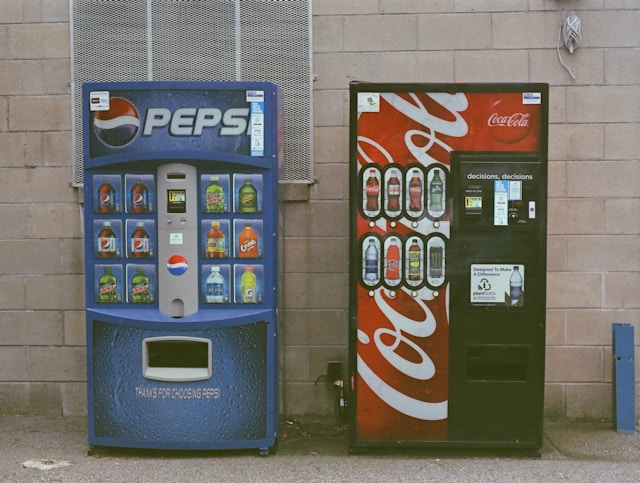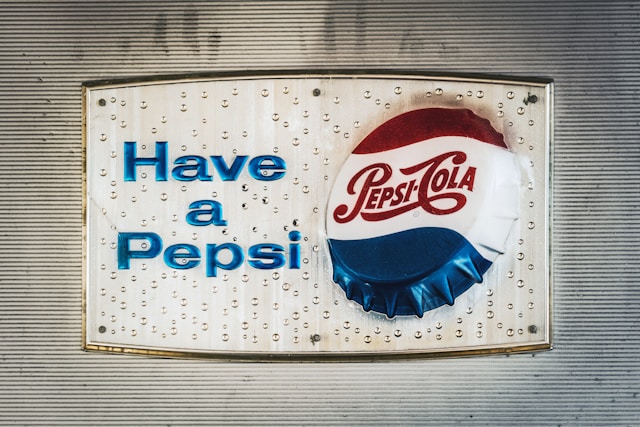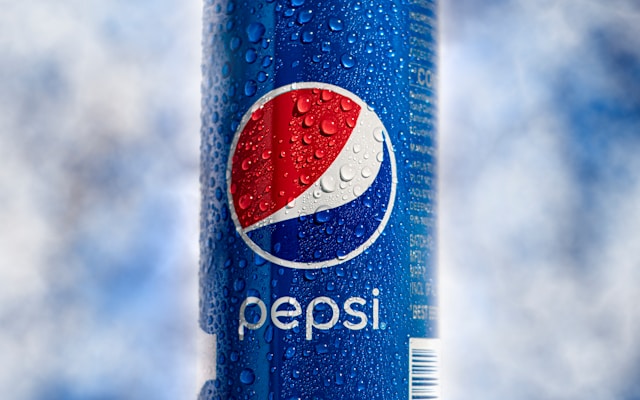The story of Pepsi’s marketing strategy is one of creativity, innovation, and an unwavering commitment to understanding the ever-changing desires of its audience. It’s a tale worth telling, and worth emulating.
In the late 19th century, a pharmacist named Caleb Bradham concocted a drink he modestly dubbed “Brad’s Drink.” By 1898, this fizzy elixir was christened Pepsi-Cola, a name now synonymous with refreshment and rebellion. But the real magic of Pepsi’s saga lies not just in its taste, but in the art of its storytelling and the cleverness of its marketing.
Setting the Stage
The early days of Pepsi’s marketing were marked by a keen sense of opportunity. During the Great Depression, while other companies faltered, Pepsi thrived by offering twice the amount of soda for the same price as its competitors. This simple, yet brilliant move established Pepsi as a value leader, an image that would serve as a foundation for future strategies.
The Cola Wars: Marketing in the 20th Century
Pepsi’s most defining chapter in its marketing narrative began in the 1970s and 1980s with the Cola Wars. This period saw Pepsi and its arch-nemesis Coca-Cola locked in a fierce battle for dominance, a duel fought not just in supermarkets but in the hearts and minds of consumers.

The Pepsi Challenge
In 1975, Pepsi launched one of the most iconic campaigns in advertising history: the Pepsi Challenge. This blind taste test pitted Pepsi directly against Coca-Cola, often in public spaces, where ordinary folks were invited to choose their preferred beverage without knowing which was which. The results, much to Pepsi’s delight, often favored the challenger. The campaign’s simplicity was its genius; it created a perception that Pepsi was the people’s choice, a fresher, more exciting alternative to the old guard.
Generation Next
The 1980s saw Pepsi embracing the youth culture with gusto. The “Pepsi Generation” campaign, featuring energetic montages of young people enjoying life to the fullest with Pepsi in hand, spoke directly to the aspirations of a younger audience. This was a masterstroke in positioning Pepsi not just as a drink, but as a lifestyle choice.
Celebrity Endorsements: The Power of Star Power
Few brands have leveraged celebrity endorsements as effectively as Pepsi. Over the decades, the company has partnered with a constellation of stars to amplify its message and reach new audiences.
Michael Jackson and the New Wave
In 1984, Pepsi teamed up with Michael Jackson, then the undisputed king of pop. This partnership produced one of the most memorable commercials of all time, featuring Jackson’s electrifying dance moves and an infectious rendition of his hit song “Billie Jean” reworked into “Pepsi Generation.” This campaign wasn’t just about selling soda; it was about aligning Pepsi with the pinnacle of pop culture.
Beyonce, Britney, and the New Millennium
The early 2000s continued this tradition with partnerships with stars like Britney Spears, Beyonce, and Pink. These campaigns were more than just advertisements; they were cultural events. The “We Will Rock You” commercial, featuring the trio in a gladiator-themed spectacle, captured the spirit of the times and reinforced Pepsi’s image as the choice of the bold and the trendy.
Innovation and Adaptation in the Digital Age
As the world entered the digital age, Pepsi adeptly pivoted to embrace new platforms and technologies, ensuring its message remained as refreshing as its product.

Social Media Savvy
Pepsi has shown a remarkable ability to engage with its audience on social media. One notable example is the “Live for Now” campaign, which encouraged consumers to seize the moment and share their experiences online. This campaign capitalized on the rise of social media influencers and user-generated content, creating a sense of community and shared excitement around the brand.
Super Bowl Spectaculars
Pepsi’s marketing acumen is perhaps most vividly displayed during the Super Bowl. Year after year, Pepsi’s commercials during this grand event are eagerly anticipated, often sparking conversations and garnering millions of views online. These ads aren’t just about selling soda; they’re about creating a spectacle, a shared cultural moment that keeps Pepsi at the forefront of public consciousness.

A Commitment to Social Responsibility
In recent years, Pepsi has also embraced social responsibility as a core component of its marketing strategy. This isn’t just a nod to changing consumer values but a genuine effort to contribute positively to society.
Pepsi Refresh Project
In 2010, Pepsi launched the Pepsi Refresh Project, an initiative that invited people to submit ideas for projects that could benefit their communities. Pepsi pledged millions of dollars to fund the best ideas, chosen by public vote. This campaign not only underscored Pepsi’s commitment to social good but also engaged consumers in a meaningful way, fostering a deeper connection with the brand.
Lessons from Pepsi’s Playbook
The story of Pepsi’s marketing strategy is rich with lessons for any brand aspiring to leave a mark. Here are a few key takeaways:
- Understand Your Audience: Pepsi’s success has always hinged on its keen understanding of its audience. From the value-driven strategies of the Depression era to the youth-focused campaigns of the 1980s, Pepsi has consistently aligned its messaging with the desires and aspirations of its consumers.
- Embrace Innovation: Pepsi’s willingness to innovate, whether through the audacious Pepsi Challenge or its savvy use of social media, has kept it relevant through changing times. Innovation isn’t just about adopting the latest technology but about finding new ways to connect with your audience.
- Leverage Cultural Moments: Pepsi’s ability to create and capitalize on cultural moments, from Super Bowl commercials to celebrity endorsements, has been a cornerstone of its marketing strategy. These moments generate buzz and embed the brand in the cultural zeitgeist.
- Commit to Social Responsibility: In today’s world, consumers expect brands to contribute positively to society. Pepsi’s initiatives like the Pepsi Refresh Project demonstrate that doing good can also be good for business.
The Road Ahead
As we look to the future, Pepsi’s marketing strategy shows no signs of slowing down. The brand continues to explore new avenues, from sustainability initiatives to new product launches, always with an eye on the horizon and an ear to the ground.
In the grand tale of Pepsi’s marketing, the common thread is a relentless pursuit of connection—whether through value, innovation, cultural alignment, or social responsibility. It’s a story that reminds us that great marketing isn’t just about selling a product but about creating a narrative that resonates, inspires, and endures.
So, dear reader, as you sip your next fizzy drink, think of the tales it tells, the moments it captures, and the lessons it imparts. For in the bubbles of Pepsi, there lies a story of marketing brilliance, waiting to inspire the next generation of marketers.
Reflecting on Pepsi’s Campaigns
Pepsi’s campaigns have often pushed the envelope, inviting both applause and criticism, but always sparking conversation. For instance, the “Live for Now” campaign took a notable turn in 2017 with a controversial advertisement featuring Kendall Jenner. The ad aimed to project a message of unity and peace but faced backlash for trivializing social justice movements. Pepsi quickly pulled the ad and issued an apology, demonstrating a responsiveness and humility in the face of missteps—a valuable lesson for any brand.
Pepsi’s marketing strategy, with its rich history of daring and innovation, is a testament to the power of understanding and engaging with your audience. It’s a strategy that has evolved with the times, always staying fresh, always staying relevant. From the Pepsi Challenge to its Super Bowl spectacles, from Michael Jackson to Beyonce, Pepsi has shown us that marketing, at its best, is both an art and a science. And as the world changes, you can bet that Pepsi will be right there, popping the top on the next big idea.
As you ponder your own marketing strategies, take a page from Pepsi’s playbook. Understand your audience, embrace innovation, create cultural moments, and commit to social responsibility. These are the ingredients of a marketing strategy that doesn’t just endure but thrives. And remember, every great brand has a story to tell. Make yours one worth listening to.
So, raise a glass—of Pepsi, naturally—to the storytellers, the innovators, and the dreamers. Here’s to the next great tale in the world of marketing.

